[ad_1]
Welcome to Saturday Morning Cartoons, our weekly column where we continue the animated boob tube ritual of yesteryear. Our lives may no longer be scheduled around small screen programming, but that doesn’t mean we should forget the necessary sanctuary of Saturday ‘toons. In this entry, we celebrate the Genndy Tartakovsky Clone Wars series just in time for its Disney+ relaunch.
While in the midst of crafting his prequels, George Lucas let his Star Wars stranglehold slip for a moment. The toy sales between The Phantom Menace and Attack of the Clones were not as strong as possible. He, and Hasbro, did not want that trend to continue during the empty years between Attack of the Clones and Revenge of the Sith. Lucas couldn’t allow his action figures to stagnate, and to prevent that, he needed new stories flowing ’round the clock. He turned to Genndy Tartakovsky.
In the early aughts, Tartakovsky already had quite the reputation. With Dexter‘s Laboratory, The Powerpuff Girls, and Samurai Jack, the animator cornered the market on peculiar ideas and action. On the surface, he did not seem like a perfect match for Lucas, but their collaboration would result in Star Wars‘ freshest spin in decades, and it would establish a massive new playground for other animators to eventually run wild.
While Genndy Tartakovsky’s Star Wars: Clone Wars would eventually get de-canonized by Lucasfilm, its three seasons remain some of the most vibrant Star Wars entertainment out there. With its arrival on Disney+ this month, we wanted to highlight the moments that made this experiment so damn special. Tartakovsky’s Clone Wars is an exhilaratingly hyper watch, operating in short bursts designed to make the most impact. No second is wasted. Good luck catching your breath.
Originally, Clone Wars was released via chapters, most of which lasted little more than three minutes. When the series came to DVD, they packaged the first two seasons as one disc and the third season as another. Disney+ has chosen to replicate the physical media format, presenting the stories as two volumes to view. As such, I chose not to select the best episodes or chapters from the series but the best moments.
10. Yoda Lays It Down
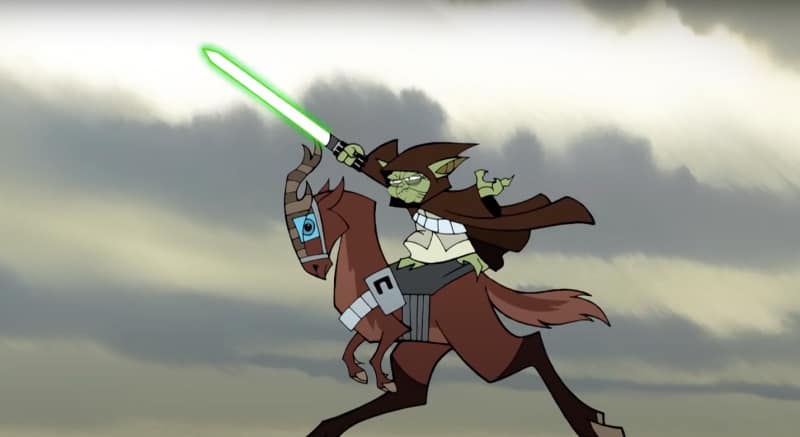
We gotta start at the beginning. The first shot of “Chapter 1” is taken from a long distance. We see a tiny Yoda silhouette riding atop an armored Kybuck. As he charges into battle, he raises his green lightsaber, and the John Williams-like score roars to life. Yoda lays it all down for the viewer, “Like fire across the galaxy, the Clone Wars spread.”
The storytelling economy is incredible. Within a few frames, Tartakovsky establishes Clone Wars‘ terrifying significance. The Separatists are on the verge of dismantling the Republic: planets are crumbling, democracies leaving with them. Anakin Skywalker’s secret love affair takes a backburner to a viral fear. Obi-Wan Kenobi has prepared his whole life for this moment. The battlefield is their new home.
While the fanbase took a few lines from A New Hope and transformed them into an epic, George Lucas never intended to wallow in the warfare. You know he hated straying too far from the Skywalkers. Tartakovsky was the first creative given the space to celebrate what the fandom always imagined. In “Chapter 1” of Clone Wars, Tartakovsky reveals his understanding of what we want: to drill into every nook and cranny.
9. Maul Ain’t Missed
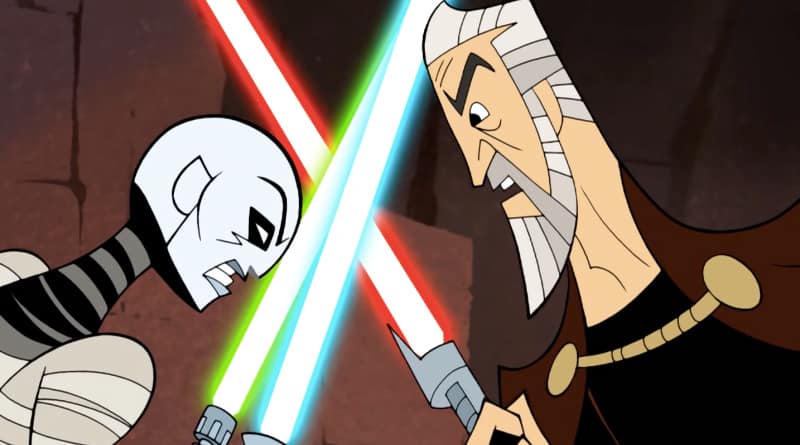
As rad as Christopher Lee was, his Count Dooku could not match Darth Maul’s striking figure. For Revenge of the Sith, Lucas worked hard on his replacement, General Grievous, and Tartakovsky was tasked with the unveiling of that nasty creation in Clone Wars (more on that asthmatic in a moment). However, Tartakovsky may have even upped the main big bad with a throwaway side villain: Asajj Ventress.
When it comes to Star Wars thugs, Sith always rolls downhill. Darth Sidious barks orders at Dooku, and Dooku returns the favor on Ventress. Not that he welcomed her with open arms. She came to him looking for a job, and only after they square-off violently in “Chapter 7” does he bother to give her the time of day. During that climax, the deadly duel-blading assassin gets her first assignment from Darth Sidious, and she takes to it with gusto. Ventress would go on to be a critical character throughout The Clone Wars‘ next iteration, but she was badass from minute one.
8. A Mechanical Nightmare
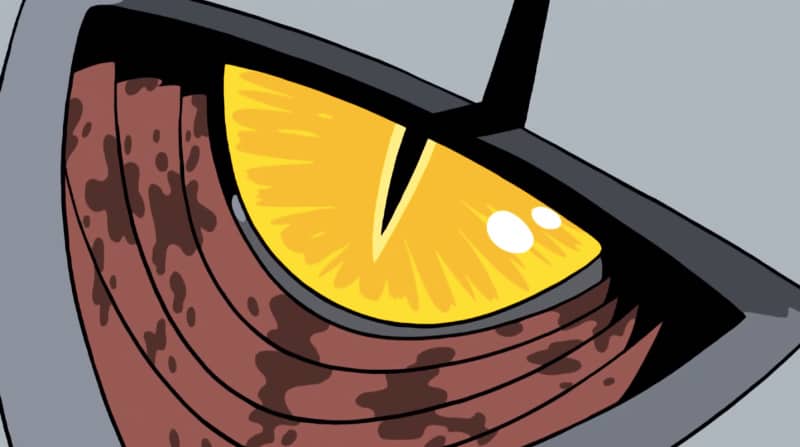
“Chapter 20” marks a major turning point in Genndy Tartakovsky’s Clone Wars. The Republic wins a mighty skirmish against the Separatists, but a new threat emerges with every victory. Master Ki-Adi-Mundi and a small squad of Jedi clash against the new droid commander, General Grievous, and their superiority comes immediately into question. These Knights are fierce, but they fall quickly, and they don’t stand up. Clone Wars plays for keeps.
As seen in the films, Grievous is a wheezing, lumbering hulk with furious outbursts. As introduced in “Chapter 20,” Grievous is a mechanical nightmare. The robo-general bounces at his prey like a cat, playing with their desperation before cutting them in half. Ki-Adi-Mundi holds his own, but barely. The Knights around him fall hard and mostly in pieces. Clone Wars‘ Grievous is as close to a slasher film killer as Star Wars is willing to get. “Ki ki ki ma ma ma…”
7. Brave New Worlds
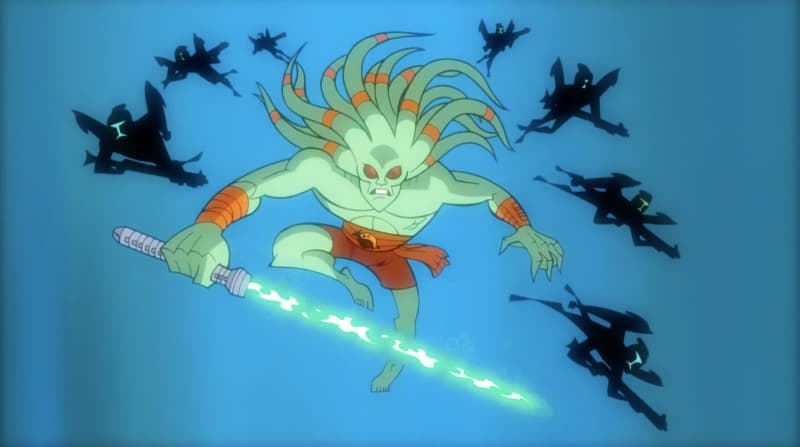
The prequels’ appeal was that they showed us realms from the Star Wars universe hinted at in comics and novels but never properly realized on screen. Lucas delivered that mostly, but Clone Wars kicked it up several notches. In “Chapter 5,” we travel to the ocean planet Dac for the first time. It’s home to two of my favorite Hasbro action figures: Admiral Ackbar and Squid Head. Their two species — the Mon Calamari and the Quarren, respectively — are divided by the Separatist civil war, and Yoda sends aquatic Jedi Kit Fisto to lend a helping hand, or er, lightsaber.
Fisto got a moment or two during the climactic siege in Attack of the Clones, but his majesty isn’t truly revealed until “Chapter 5” of Star Wars: Clone Wars. Underwater, Fisto chews through multiple Manta Subfigthers while never dropping his smile. He’s hit nirvana, and so have we. Star Wars fans love an elemental environment, and Dac proudly places itself alongside Hoth and Tatooine. Once these pesky firefights depart, their tourism board will ignite.
6. More Than A Legend
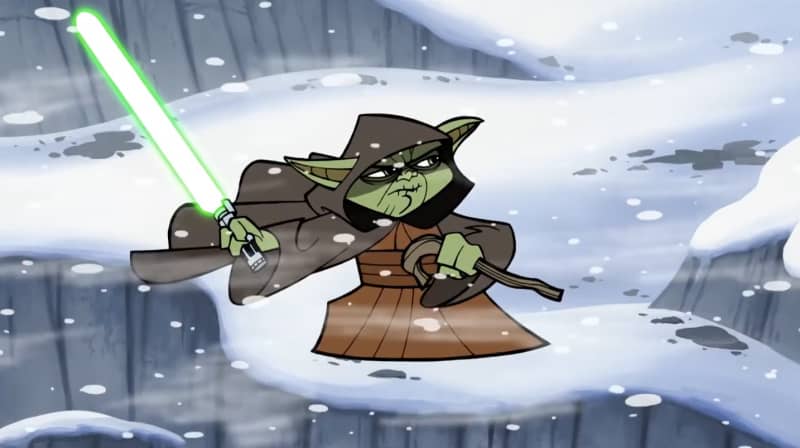
Attack of the Clones showed us that Yoda is more than a legend; he is a legendary fighter. From the first shot, Genndy Tartakovsky’s Clone Wars doubles down. He may be short, he may be old, but he’s fast, and he cuts with a precision that comes from wisdom. Why stretch out a fight in ten moves when five will do.
In “Chapter 15” of Star Wars: Clone Wars, Yoda diverts Senator Amidala’s mission to another planet. He can sense two Jedi in peril, and as he makes his way to their location, he is attacked by a Battle Droid battalion. He doesn’t hesitate. The blade comes out, and the heads come off. They’re not people; they’re parts.
Along with investing heavily into Star Wars canon, Tartakovsky studied the Samurai cinema that initially inspired Lucas. Watching Yoda cut through these rusty chumps, you can see the movements of Toshiro Mifune. Clone Wars‘ lightsaber battles race to their conclusion, but they never lose their balletic quality. There is a rhythm to every conflict, and they’re built for the rewind button. You wanna watch Yoda dice on repeat.

[ad_2]
Source link